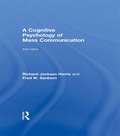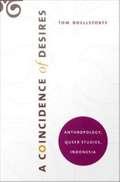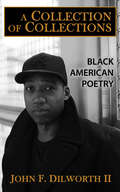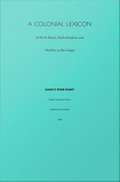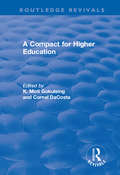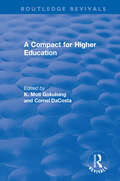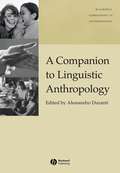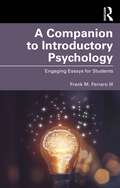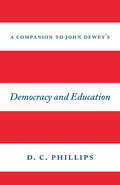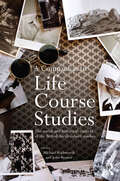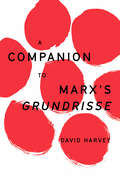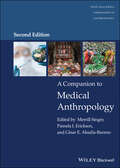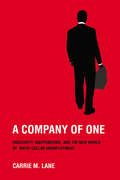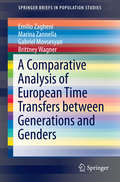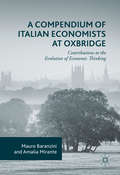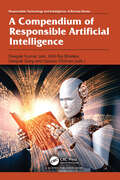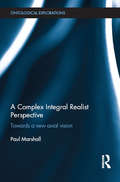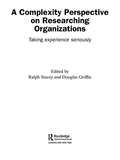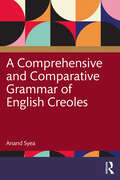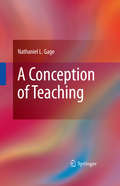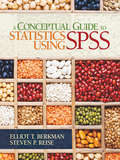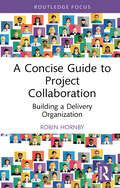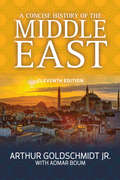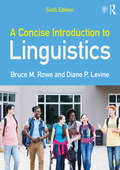- Table View
- List View
A Cognitive Psychology of Mass Communication
by Richard Jackson Harris Fred W. SanbornA Cognitive Psychology of Mass Communication is the go-to text for any course that adopts a cognitive and psychological approach to the study of mass communication. In its sixth edition, it continues its examination of how our experiences with media affect the way we acquire knowledge about the world, and how this knowledge influences our attitudes and behavior. Using theories from psychology and communication along with reviews of the most up-to-date research, this text covers a diversity of media and media issues ranging from commonly discussed topics, such as politics, sex, and violence, to lesser-studied topics, such as sports, music, emotion, and prosocial media. This sixth edition offers chapter outlines and recommended readings lists to further assist readability and accessibility of concepts, and a new companion website that includes recommended readings, even more real-world examples and activities, PowerPoint presentations, sample syllabi, and an instructor guide.
A Coincidence of Desires: Anthropology, Queer Studies, Indonesia
by Tom BoellstorffIn A Coincidence of Desires, Tom Boellstorff considers how interdisciplinary collaboration between anthropology and queer studies might enrich both fields. For more than a decade he has visited Indonesia, both as an anthropologist exploring gender and sexuality and as an activist involved in HIV prevention work. Drawing on these experiences, he provides several in-depth case studies, primarily concerning the lives of Indonesian men who term themselves gay (an Indonesian-language word that overlaps with, but does not correspond exactly to, the English word "gay"). These case studies put interdisciplinary research approaches into practice. They are preceded and followed by theoretical meditations on the most productive forms that collaborations between queer studies and anthropology might take. Boellstorff uses theories of time to ask how a model of "coincidence" might open up new possibilities for cooperation between the two disciplines. He also juxtaposes his own work with other scholars' studies of Indonesia, Thailand, the Philippines, Malaysia, and Singapore to compare queer sexualities across Southeast Asia. In doing so, he asks how comparison might be understood as a queer project and how queerness might be understood as comparative. The case studies contained in A Coincidence of Desires speak to questions about the relation of sexualities to nationalism, religion, and globalization. They include an examination of zines published by gay Indonesians; an analysis of bahasa gay--a slang spoken by gay Indonesians that is increasingly appropriated in Indonesian popular culture; and an exploration of the place of warias (roughly, "male-to-female transvestites") within Indonesian society. Boellstorff also considers the tension between Islam and sexuality in gay Indonesians' lives and a series of incidents in which groups of men, identified with Islamic fundamentalism, violently attacked gatherings of gay men. Collectively, these studies insist on the primacy of empirical investigation to any queer studies project that wishes to speak to the specificities of lived experience.
A Collection of Collections: Black American Poetry
by John F Dilworth IIA Collection of Collections is a volume of poetry by John F. Dilworth II that explores the author's experiences maneuvering through life as a young Black man in America in this tumultuous 21st century.Through his poems, John motivates people to be passionate about their purpose and open to sharing their perspective. He captures the beauty and purpose of people hurting and striving. Some of the words may trigger a variety of emotions, but that is where the healing can be found.
A Colonial Lexicon: Of Birth Ritual, Medicalization, and Mobility in the Congo
by Nancy Rose HuntA Colonial Lexicon is the first historical investigation of how childbirth became medicalized in Africa. Rejecting the "colonial encounter" paradigm pervasive in current studies, Nancy Rose Hunt elegantly weaves together stories about autopsies and bicycles, obstetric surgery and male initiation, to reveal how concerns about strange new objects and procedures fashioned the hybrid social world of colonialism and its aftermath in Mobutu's Zaire. Relying on archival research in England and Belgium, as well as fieldwork in the Congo, Hunt reconstructs an ethnographic history of a remote British Baptist mission struggling to survive under the successive regimes of King Leopold II's Congo Free State, the hyper-hygienic, pronatalist Belgian Congo, and Mobutu's Zaire. After exploring the roots of social reproduction in rituals of manhood, she shows how the arrival of the fast and modern ushered in novel productions of gender, seen equally in the forced labor of road construction and the medicalization of childbirth. Hunt focuses on a specifically interwar modernity, where the speed of airplanes and bicycles correlated with a new, mobile medicine aimed at curbing epidemics and enumerating colonial subjects. Fascinating stories about imperial masculinities, Christmas rituals, evangelical humor, colonial terror, and European cannibalism demonstrate that everyday life in the mission, on plantations, and under a strongly Catholic colonial state was never quite what it seemed. In a world where everyone was living in translation, privileged access to new objects and technologies allowed a class of "colonial middle figures"--particularly teachers, nurses, and midwives--to mediate the evolving hybridity of Congolese society. Successfully blurring conventional distinctions between precolonial, colonial, and postcolonial situations, Hunt moves on to discuss the unexpected presence of colonial fragments in the vibrant world of today's postcolonial Africa. With its close attention to semiotics as well as sociology, A Colonial Lexiconwill interest specialists in anthropology, African history, obstetrics and gynecology, medical history, religion, and women's and cultural studies.
A Community of Europeans? Transnational Identities and Public Spheres
by Thomas RisseIn A Community of Europeans?, a thoughtful observer of the ongoing project of European integration evaluates the state of the art about European identity and European public spheres. Thomas Risse argues that integration has had profound and long-term effects on the citizens of EU countries, most of whom now have at least a secondary "European identity" to complement their national identities. Risse also claims that we can see the gradual emergence of transnational European communities of communication. Exploring the outlines of this European identity and of the communicative spaces, Risse sheds light on some pressing questions: What do "Europe" and "the EU" mean in the various public debates? How do European identities and transnational public spheres affect policymaking in the EU? And how do they matter in discussions about enlargement, particularly Turkish accession to the EU? What will be the consequences of the growing contestation and politicization of European affairs for European democracy?This focus on identity allows Risse to address the "democratic deficit" of the EU, the disparity between the level of decision making over increasingly relevant issues for peoples' lives (at the EU) and the level where politics plays itself out in the member states. He argues that the EU's democratic deficit can only be tackled through politicization and that "debating Europe" might prove the only way to defend modern and cosmopolitan Europe against the increasingly forceful voices of Euroskepticism. "
A Compact for Higher Education (Routledge Revivals)
by K. Moti Gokulsing Cornel DaCOSTAThis title was first published in 2000. This is a collection of papers which look at the relationship between higher education and those who use it, and those who will in the future. The papers look at how compacts could be developed to encourage the potential for maintaining and improving upon existing education agreements. The book covers the university and higher education institutions and their relationship with government and industry as well as with the students.
A Compact for Higher Education (Routledge Revivals)
by K. Moti Gokulsing Cornel DaCostaThis title was first published in 2000. This is a collection of papers which look at the relationship between higher education and those who use it, and those who will in the future. The papers look at how compacts could be developed to encourage the potential for maintaining and improving upon existing education agreements. The book covers the university and higher education institutions and their relationship with government and industry as well as with the students.
A Companion To Linguistic Anthropology (Wiley Blackwell Companions To Anthropology Ser.)
by Alessandro DurantiA Companion to Linguistic Anthropology provides a series of in-depth explorations of key concepts and approaches by some of the scholars whose work constitutes the theoretical and methodological foundations of the contemporary study of language as culture.
A Companion to Introductory Psychology: Engaging Essays for Students
by Frank M. Ferraro IIIA Companion to Introductory Psychology is a rich collection of thought-provoking chapters, which enhance student interest and promote group discussions, training entry-level students in critical thinking skills and engaging them with course material.Organized into five key sections—Biological, Cognition, Developmental, Social and Personality, and Mental and Physical Health—each features contemporary chapters accompanied by insightful discussion questions, further resources, and activities to encourage reflection by the reader and to promote group debate in a classroom context. These prompt readers to reflect deeply, to evaluate long-held beliefs and/or personal biases, and to assess controversial topics by analyzing them through a psychological lens.Mapped to the American Psychological Association Pillar model, this book will benefit a wide variety of audiences ranging from high school to college undergraduates. Primarily useful for courses in introductory psychology, this book is also practical for courses in behavioral neuroscience, cognitive psychology, developmental psychology, social psychology, health psychology, and abnormal and clinical psychology.
A Companion to John Dewey's Democracy and Education
by D.C. PhillipsThis year marks the centenary publication of John Dewey’s magnum opus, Democracy and Education. Despite its profound importance as a foundational text in education, it is notoriously difficult and—dare we say it—a little dry. In this charming and often funny companion, noted philosopher of education D. C. Phillips goes chapter by chapter to bring Dewey to a twenty-first-century audience. Drawing on over fifty years of thinking about this book—and on his own experiences as an educator—he lends it renewed clarity and a personal touch that proves its lasting importance. Phillips bridges several critical pitfalls of Democracy and Education that often prevent contemporary readers from fully understanding it. Where Dewey sorely needs a detailed example to illustrate a point—and the times are many—Phillips steps in, presenting cases from his own classroom experiences. Where Dewey casually refers to the works of people like Hegel, Herbart, and Locke—common knowledge, apparently, in 1916—Phillips fills in the necessary background. And where Dewey gets convoluted or is even flat-out wrong, Phillips does what few other scholars would do: he takes Dewey to task. The result is a lively accompaniment that helps us celebrate and be enriched by some of the most important ideas ever offered in education.
A Companion to Life Course Studies: The Social and Historical Context of the British Birth Cohort Studies (Routledge Advances in Sociology)
by Michael Wadsworth; John BynnerSince the end of the Second World War, society has been characterised by rapid and extensive political, economic, scientific, and technological change. Opportunities for education, employment, human relations, and good health, have all been greatly affected by those changes, as have all aspects of life. Consequently, each post-war generation has been like no other before or since. Britain, uniquely, has five large-scale life course studies that began at intervals throughout that period. They have shown how lives are shaped by individual characteristics, their past and current experiences and opportunities, and so reflect their times. This book describes those fundamental changes that affected life chances differently in each generation, and how governments struggled to accommodate the changes with new policies for improving and managing the nation's capital in terms of education, family policy, health, human rights, and economics. A Companion to Life Course Studies provides a resource for the interpretation of the findings and design differences in the five studies, and the stimulus for new comparisons of life course between these differing generations that would contribute to policy and to understanding.
A Companion to Marx's Grundrisse
by David HarveyDavid Harvey tackles Marx's notebooks that have spawned wide-ranging and raging controversiesWhen leading scholar of Marx, Roman Rosdolsky, first encountered the virtually unknown text of Marx&’s Grundrisse - his preparatory work for his masterpiece Das Capital - in the 1950s in New York Public Library, he recognized it as &“a work of fundamental importance,&” but declared &“its unusual form&” and &“obscure manner of expression, made it far from suitable for reaching a wide circle of readers.&”David Harvey&’s Companion to Marx&’s Grundrisse builds upon his widely acclaimed companions to the first and second volumes of Capital in a way that will reach as wide an audience as possible. Marx&’s stated ambition for this text - where he was thinking aloud about some of possible metamorphoses of capitalism - is to reveal &“the exact development of the concept of capital as the fundamental concept of modern economics, just as capital itself is the foundation of bourgeois society.&” While respecting Marx&’s desire to &“bring out all the contradictions of bourgeois production, as well as the boundary where it drives beyond itself,&” David Harvey also pithily illustrates the relevance of Marx&’s text to understanding the troubled state of contemporary capitalism.
A Companion to Medical Anthropology (Wiley Blackwell Companions to Anthropology)
by Merrill Singer Pamela I. Erickson César E. Abadía-BarreroThe fully revised new edition of the defining reference work in the field of medical anthropology A Companion to Medical Anthropology, Second Edition provides the most complete account of the key issues and debates in this dynamic, rapidly growing field. Bringing together contributions by leading international authorities in medical anthropology, this comprehensive reference work presents critical assessments and interpretations of a wide range of topical themes, including global and environmental health, political violence and war, poverty, malnutrition, substance abuse, reproductive health, and infectious diseases. Throughout the text, readers explore the global, historical, and political factors that continue to influence how health and illness are experienced and understood. The second edition is fully updated to reflect current controversies and significant new developments in the anthropology of health and related fields. More than twenty new and revised articles address research areas including war and health, illicit drug abuse, climate change and health, colonialism and modern biomedicine, activist-led research, syndemics, ethnomedicines, biocommunicability, COVID-19, and many others. Highlighting the impact medical anthropologists have on global health care policy and practice, A Companion to Medical Anthropology, Second Edition: Features specially commissioned articles by medical anthropologists working in communities worldwide Discusses future trends and emerging research areas in the field Describes biocultural approaches to health and illness and research design and methods in applied medical anthropology Addresses topics including chronic diseases, rising levels of inequality, war and health, migration and health, nutritional health, self-medication, and end of life care Part of the acclaimed Wiley Blackwell Companions to Anthropology series, A Companion to Medical Anthropology, Second Edition, remains an indispensable resource for medical anthropologists, as well as an excellent textbook for courses in medical anthropology, ethnomedicine, global health care, and medical policy.
A Company of One: Insecurity, Independence, and the New World of White-Collar Unemployment
by Carrie M. LaneBeing laid off can be a traumatic event. The unemployed worry about how they will pay their bills and find a new job. In the American economy's boom-and-bust business cycle since the 1980s, repeated layoffs have become part of working life. In A Company of One, Carrie M. Lane finds that the new culture of corporate employment, changes to the job search process, and dual-income marriage have reshaped how today's skilled workers view unemployment. Through interviews with seventy-five unemployed and underemployed high-tech white-collar workers in the Dallas area over the course of the 2000s, Lane shows that they have embraced a new definition of employment in which all jobs are temporary and all workers are, or should be, independent "companies of one."Following the experiences of individual jobseekers over time, Lane explores the central role that organized networking events, working spouses, and neoliberal ideology play in forging and reinforcing a new individualist, pro-market response to the increasingly insecure nature of contemporary employment. She also explores how this new perspective is transforming traditional ideas about masculinity and the role of men as breadwinners. Sympathetic to the benefits that this "company of one" ideology can hold for its adherents, Lane also details how it hides the true costs of an insecure workforce and makes collective and political responses to job loss and downward mobility unlikely.
A Comparative Analysis of European Time Transfers between Generations and Genders (SpringerBriefs in Population Studies)
by Emilio Zagheni Marina Zannella Gabriel Movsesyan Brittney WagnerThis comparative study of European time transfers reveals the full extent of transfers in the form of unpaid work and highlights the existence of important gender differences in household time production. A large quantity of goods and services are produced by household members for their own consumption, without involving market transactions. Despite the economic and social importance of unpaid work, these productive activities are largely invisible to traditional national economic accounts. As a consequence, standard measures of intergenerational transfers typically ignore household production, and thus underestimate the overall value of goods and services produced over the life cycle; in particular, the economic contribution of females. The book uses a life course approach to offer policy-relevant insights into the effect of demographic and social change on intergenerational ties and gender inequality in household production.
A Compendium of Italian Economists at Oxbridge: Contributions to the Evolution of Economic Thinking
by Mauro Baranzini Amalia MiranteThisstudy examines five decades of Italian economists who studied or researched atthe Universities of Oxford and Cambridge between the years 1950 and 2000. Providing a detailed list of Italian economists associated with Hicks, Harrod,Bacharach, Flemming, Mirrlees, Sen and other distinguished dons, the authorsexamine eleven research lines, including the Sraffa and the neo-Ricardianschool, the post-Keynesian school and the Stone's and Goodwin's schools. Baranzini and Mirante trace the influence of the schools in terms of 1) theirfundamental role in the evolution of economic thought; 2) their promotion offour key controversies (on the measurement of technical progress, on capitaltheory, on income distribution and on the inter-generational transmission ofwealth); 3) the counter-flow of Oxbridge scholars to academia in Italy, and 4)the invigoration of a third generation of Italian economists researching orteaching at Oxbridge today. A must-read for all those interested in the way Italian and British research has shaped the study and teaching of economics.
A Compendium of Responsible Artificial Intelligence (Responsible Technology and Intelligence)
by Deepak Garg Deepak Kumar Jain Gaurav Dhiman Kirti Raj BhateleTaking a broad, multidisciplinary approach to the ethical, legal, and practical dimensions of developing AI, the book puts key issues such as bias, transparency, accountability, and privacy at center stage. From computer science through law and ethics into policy, it lays down the roadmap on which developers, data scientists, and policymakers could bring AI technologies properly attuned to societal values. This book can be read as a resource for those who want to be able to guide the development and deployment of responsibly controlled AI systems.
A Complex Integral Realist Perspective: Towards A New Axial Vision
by Paul MarshallThis book sketches the contours of a vision that moves beyond the dominant paradigm or worldview that underlies and governs modernity (and postmodernity). It does so by drawing on the remarkable leap in human consciousness that occurred during the Axial Age and on a cross-pollination of what are arguably the three most comprehensive integrative metatheories available today: Complex thought, integral theory and critical realism – i.e. a complex integral realism. By deploying the three integrative metatheories this book recounts how the seeds of a number of biases within the Western tradition – analytical over dialectical, epistemology over ontology, presence over absence and exterior over interior – were first sown in axial Greece, later consolidated in European modernity and then challenged throughout the 20th century. It then discusses the remedies provided by the three integrative philosophies, remedies that have paved the way for a new vision. Outlining a ‘new axial vision’ for the twenty-first century which integrates the best of premodernity, modernity and postmodernity within a complex integral realist framework, this book will be of interest to students and scholars of the Axial Age, critical realism, integral theory and complex thought. It will also appeal to those interested in a possible integration of the insights and knowledge gleaned by science, spirituality and philosophy.
A Complexity Perspective on Researching Organisations: Taking Experience Seriously (Complexity as the Experience of Organizing)
by Douglas Griffin Ralph StaceyPart of the Complexity as the Experience of Organizing series, this book applies complex responsiveness theory to real-life leadership experiences. It features contributions from and details the experience of organizational practitioners, leaders, consultants and managers from various organizations through narrative accounts. It addresses questions such as: How do widespread or global patterns emerge and evolve in the local interactions between people? What actually happens in global change programmes? What does this imply about the relationship between the local and the global? Exploring the perspective of complex responsive processes, the book’s contributors examine how this assists them in making sense of their experience, and how this awareness then leads to their development. This book is a valuable study for academics, business school students and practitioners, as rather than offering mere descriptions of organizational life, it provides reflective accounts of real-life experiences of researching in organizations.
A Comprehensive and Comparative Grammar of English Creoles
by Anand SyeaA Comprehensive and Comparative Grammar of English Creoles provides a detailed, comprehensive description of the morphology, grammar, and syntax of a selected number of English creoles, including those spoken on both sides of the Atlantic and the Pacific. This book: • Focuses on a number of traditional grammatical categories to provide a comprehensive description and discussion of these languages; • Identifies not only how creoles differ from their lexifier, but also how they differ from one another; • Provides effective comparative descriptions to enable an insightful understanding of language evolution. This book will be ideal supplementary reading for students and researchers of linguistics, and will particularly appeal to those with an interest in descriptive linguistics, historical linguistics, World Englishes, contact and creole linguistics, and language policy and planning.
A Conception of Teaching
by Nathaniel L. GageThe literature of the behavioural and social sciences is full of theory and research on learning and memory. Teaching is comparatively a stepchild, neglected by those who have built a formidable body of theories of learning and memory. However, teaching is where learning and memory theory should pay off. "A Conception of Teaching" dedicates a chapter to each of the following important components: the need for a theory; the possibility of a theory; the evolution of a paradigm for the study of teaching; a conception of the process of teaching; a conception of the content of teaching; a conception of students' cognitive capabilities and motivations; a conception of classroom management; and the integration of these conceptions. Written in a highly accessible style, while maintaining a base in research, Dr. Nathaniel L. Gage presents "A Conception of Teaching" with clarity and well situated within current educational debates.
A Conceptual Guide to Statistics Using SPSS
by Steven P. Reise Elliot T. BerkmanBridging an understanding of Statistics and SPSS.This unique text helps students develop a conceptual understanding of a variety of statistical tests by linking the ideas learned in a statistics class from a traditional statistics textbook with the computational steps and output from SPSS. Each chapter begins with a student-friendly explanation of the concept behind each statistical test and how the test relates to that concept. The authors then walk through the steps to compute the test in SPSS and the output, clearly linking how the SPSS procedure and output connect back to the conceptual underpinnings of the test. By drawing clear connections between the theoretical and computational aspects of statistics, this engaging text aids students' understanding of theoretical concepts by teaching them in a practical context.
A Concise Guide to Project Collaboration: Building a Delivery Organization
by Robin HornbyEasy to read and act on immediately, this concise guide shows how organizations can work more effectively with in-house or contracted project managers and their teams, using specific collaborative techniques to improve success rates, reduce project costs, and enable organizations to benefit from common-sense, cost-effective project management approaches that work. Using a clear structure and accessible style, the book demonstrates how: Managers can create an organizational environment more naturally adapted for project work and recognition of business priorities; Barriers to project work can be removed so project managers can focus on resolving real project problems; Specific collaborative project management methods engaging business owners, users, and technical teams can be illuminated and implemented; Projects can fit within an architecture that aligns with business needs using models and workflow designs; and Standardized delivery management can unify in-house and vendor teams to create a uniform and predictable owner experience. The book is aimed at managers and executives (both IT and users) in corporations and vendor firms who are engaged in delivering projects. The book will also be invaluable to any project manager or senior practitioner who is interested in a business-oriented, unified, and collaborative approach to project management.
A Concise History of the Middle East: Eleventh Edition
by Arthur Goldschmidt Jr. Aomar BoumAn introduction to the history of this turbulent region from the beginnings of Islam to the present day, this widely acclaimed text by Arthur Goldschmidt Jr. is distinguished by its clear style, broad scope, and balanced treatment. This book explores the evolution of Islamic institutions and culture, the influence of the West, the modernization efforts of Middle Eastern governments, the struggle of various peoples for political independence, the Arab-Israeli conflict, the reassertion of Islamic values and power, the issues surrounding the Palestinian Question, and the post-9/11 Middle East. The eleventh edition has been fully revised to reflect the most recent events in, and concerns of, the region, including an expanded and more nuanced discussion of the "War on Terrorism" and the Arab uprisings, coverage of the rise of ISIS, and a new chapter on the growing environmental problems of the region. In addition, the authors have incorporated new scholarship on the early history to provide a fuller picture of the political shifts and socioeconomic concerns of that time. With updated bibliographical sketches, chronology and glossary, A Concise History of the Middle East remains an essential text for students of Middle East history.
A Concise Introduction to Linguistics
by Bruce M. Rowe Diane P. LevineNow in its sixth edition, A Concise Introduction to Linguistics provides students with a detailed introduction to the core concepts of language as it relates to culture. The textbook includes a focus on linguistic anthropology, unpacking the main contributions of linguistics to the study of human communication and culture. Aimed at the general education student, the textbook also provides anthropology, linguistics, and English majors with the resources needed to pursue advanced courses in this area. Written in an accessible manner that does not assume previous knowledge of linguistics, this new edition contains expanded discussions on linguistic anthropology, sociolinguistics (including an expanded section on trans and nonbinary language), and pragmatics. The textbook incorporates a robust set of pedagogical features, including marginal definitions, a substantial glossary, chapter summaries, and learning exercises. Brand new to this edition are a full International Phonetic Alphabet chart, new exercises with languages other than English, and new illustrations.
